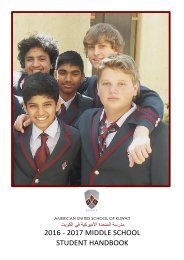AUS_HS_Student Handbook2016-17 rev 6 16 16 -003- (1)
Create successful ePaper yourself
Turn your PDF publications into a flip-book with our unique Google optimized e-Paper software.
Academic Integrity<br />
<strong>Student</strong>s are expected to have integrity and self-discipline and to display respect for themselves, others, and the school. The<br />
school considers any incident of academic cheating or plagiarism very seriously. Examples include:<br />
copying another student’s class work or homework;<br />
asking another student questions during a test or copying another student’s test answers;<br />
allowing a student to copy one’s own homework or giving another student test answers;<br />
turning in any material claimed as one’s own but coming from another source (for example, copying material from an<br />
online resource without crediting the source).<br />
These actions are dishonest and unacceptable. Academic dishonesty is one of the most serious violations of school expectations<br />
and may result in expulsion.<br />
Many colleges require the secondary school to report incidents of academic dishonesty to them when the student is applying to<br />
the college for acceptance.<br />
Learning Support<br />
The American United School of Kuwait provides services for students who are identified as having mild learning differences. <strong>AUS</strong><br />
does not have an expansive educational program for children with moderate or severe learning disabilities. The <strong>Student</strong> Support<br />
Team (SST) Program offered at <strong>AUS</strong>, has a qualified teacher who provides the classroom teachers with teaching strategies and<br />
accommodations (accommodations are changes in the teaching methods, environments, modalities) for all students who have<br />
been admitted into receiving learning support services. <strong>Student</strong>s are admitted to receiving SST through the <strong>Student</strong> Review<br />
Team Meeting process, which takes place after a student has received identified and documented interventions from teachers.<br />
Modifications, changes in learning objectives according to the standards, are not included as part of the policy at this school. The<br />
High School SST program is primarily an inclusion service delivery model that provides three levels of academic support.<br />
<strong>Student</strong>s are identified through the <strong>Student</strong> Review Team process and placed in the appropriate level of SST, based on entry/exit<br />
criteria.<br />
The purpose of learning support is to identify areas of concern and initiate a system of communication and support that includes<br />
the student, parent, counselor, teachers and administration. Counselors will regularly run a report (at risk report) on a bimonthly<br />
basis to inform teachers of students who are struggling. Teachers will be expected to contact parents of students who are<br />
struggling academically.<br />
Once students are identified they are placed on Academic Alert. An Academic Alert is issued when a student has earned a grade<br />
of “D” or below on a report (mid-semester or semester). Learning support is begun based on the following leveled support:<br />
The first level is High School Success class which promotes managing the high school workload through developing<br />
study skills, test prep strategies, learning strategies, enhancing organizational management, goal-setting and selfadvocacy.<br />
The second level involves teacher support inside the classrooms and/ or additional support during the school<br />
enrichment period. This inclusion environment involves accommodation, small group direct instruction, and coteaching<br />
with opportunities for pre-teaching and re-teaching.<br />
Based on need, a student may qualify to receive a third level of support involving assignment to a Foundational<br />
Reading/ Math course or be required to attend the Extended Learning Program (ELP) held after school on Mondays,<br />
Tuesdays, and Wednesdays from 2:45-3:30.<br />
<strong>Student</strong>s who do not find success at the third level is assigned to the intervention teacher as case manager who will work<br />
collaboratively with the student’s classroom teachers and school administration to develop and implement the <strong>Student</strong> Action<br />
Plan.<br />
ACADEMIC IMPROVEMENT PLAN<br />
<strong>Student</strong>s who were p<strong>rev</strong>iously on an Academic Alert will be elevated to Academic Improvement Plans. Administrators notify<br />
parents and set a meeting to discuss the ongoing difficulties and the inability to meet the terms of the Academic Alert. The<br />
Academic Improvement Plan is a more comprehensive document that includes check-ins, timelines and expectations for<br />
improved performance. The Academic Improvement Plan is usually set for a period of one calendar year, and a copy of the plan<br />
is kept in the student’s file. The two components to the Academic Improvement Plan are the <strong>Student</strong> Responsibility Plan and the<br />
Academic Support Plan:<br />
13
















